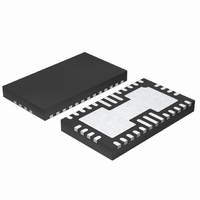LT6604CUFF-15#TRPBF Linear Technology, LT6604CUFF-15#TRPBF Datasheet - Page 11

LT6604CUFF-15#TRPBF
Manufacturer Part Number
LT6604CUFF-15#TRPBF
Description
IC AMP DIFF LN DUAL 34-QFN
Manufacturer
Linear Technology
Datasheet
1.LT6604IUFF-15PBF.pdf
(16 pages)
Specifications of LT6604CUFF-15#TRPBF
Amplifier Type
Differential
Number Of Circuits
2
Output Type
Differential
Current - Input Bias
35µA
Voltage - Input Offset
10000µV
Current - Supply
38mA
Voltage - Supply, Single/dual (±)
3 V ~ 11 V, ±1.5 V ~ 5.5 V
Operating Temperature
0°C ~ 70°C
Mounting Type
Surface Mount
Package / Case
34-QFN
Lead Free Status / RoHS Status
Lead free / RoHS Compliant
Current - Output / Channel
-
-3db Bandwidth
-
Slew Rate
-
Gain Bandwidth Product
-
Available stocks
Company
Part Number
Manufacturer
Quantity
Price
APPLICATIONS INFORMATION
where impedance must be considered is the evaluation of
the LT6604-15 with a network analyzer.
Figure 5 is a laboratory setup that can be used to char-
acterize the LT6604-15 using single-ended instruments
with 50Ω source impedance and 50Ω input impedance.
For a unity gain confi guration the LT6604-15 requires
an 536Ω source resistance yet the network analyzer
output is calibrated for a 50Ω load resistance. The 1:1
transformer, 52.3Ω and 523Ω resistors satisfy the two
constraints above. The transformer converts the single-
ended source into a differential stimulus. Similarly, the
output of the LT6604-15 will have lower distortion with
larger load resistance yet the analyzer input is typically
50Ω. The 4:1 turns (16:1 impedance) transformer and the
two 402Ω resistors of Figure 5, present the output of the
LT6604-15 with a 1600Ω differential load, or the equiva-
lent of 800Ω to ground at each output. The impedance
seen by the network analyzer input is still 50Ω, reducing
refl ections in the cabling between the transformer and
analyzer input.
Differential and Common Mode Voltage Ranges
The differential amplifi ers inside the LT6604-15 contain
circuitry to limit the maximum peak-to-peak differential
voltage through the fi lter. This limiting function prevents
excessive power dissipation in the internal circuitry and
provides output short-circuit protection. The limiting
function begins to take effect at output signal levels
Figure 6. Output Level vs Input Level, Differential
1MHz Input, Gain = 1
–100
–20
–40
–60
–80
20
0
0
HARMONIC
3RD HARMONIC
2ND
85°C
1
1dB COMPRESSION
1MHz INPUT LEVEL (V
2ND HARMONIC, 25°C
2
3RD HARMONIC
25°C
3
POINTS
4
85°C
5
P-P
85°C
)
25°C
6
660415 F06
7
above 2V
This is illustrated in Figure 6; the LT6604-15 channel was
confi gured with unity passband gain and the input of the
fi lter was driven with a 1MHz signal. Because this voltage
limiting takes place well before the output stage of the
fi lter reaches the supply rails, the input/output behavior
of the IC shown in Figure 6 is relatively independent of
the power supply voltage.
The two amplifi ers inside the LT6604-15 channel have
independent control of their output common mode voltage
(see the Block Diagram section). The following guidelines
will optimize the performance of the fi lter.
V
AC ground with a 0.01μF capacitor or some instability may
be observed. V
source, provided it remains at least 1.5V above V
least 1.5V below V
voltage of V
matched, their absolute value can vary by ±20%. This
should be taken into consideration when connecting an
external resistor network to alter the voltage of V
V
common mode output voltage is required, connect V
to a voltage source or resistor network. For 3V and 3.3V
supplies the voltage at V
to the mid supply level. For example, voltage (V
1.65V on a single 3.3V supply. For power supply voltages
higher than 3.3V the voltage at V
supply. The voltage on V
below the voltage on V
not be more than 2V above the voltage on V
a high impedance input.
The LT6604-15 was designed to process a variety of input
signals including signals centered on the mid-supply volt-
age and signals that swing between ground and a positive
voltage in a single supply system (Figure 1). The range of
allowable input common mode voltage (the average of V
and V
level and gain setting (see Distortion vs Input Common
Mode Level in the Typical Performance Characteristics).
MID
OCM
can be allowed to fl oat, but it must be bypassed to an
IN
can be shorted to V
–
in Figure 1) is determined by the power supply
P-P
MID
and it becomes noticeable above 3.5V
MID
. While the internal 11k resistors are well
+
can be driven from a low impedance
. An internal resistor divider sets the
MID
OCM
OCM
MID
. The voltage on V
should not be more than 1V
must be less than or equal
for simplicity. If a different
OCM
can be set above mid
LT6604-15
MID
OCM
. V
–
11
MID
OCM
should
OCM
and at
660415fb
OCM
.
P-P
) ≤
IN
is
+
.











